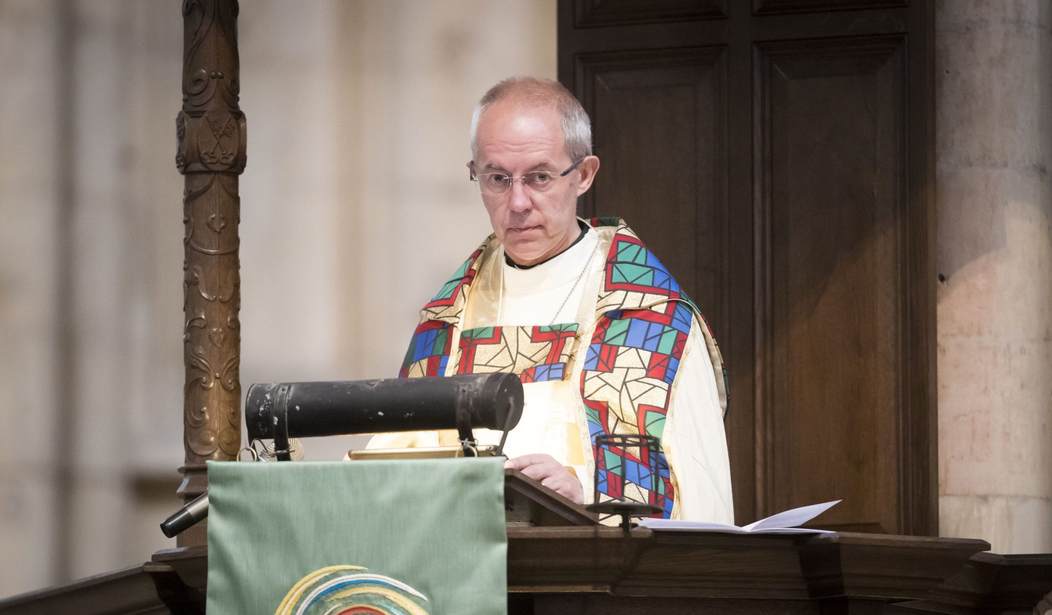On Wednesday, the archbishop of Canterbury, who leads the Church of England and is the symbolic head of the global Anglican Church, said he “dreamed” of a time when governments would replace church charities. This arguably represents a weird trusting of the state over the charitable efforts of followers of Jesus Christ.
“Today I dream that governments, now and in the future, put church-run food banks out of business. I dream of empty night shelters,” Justin Welby said in a speech celebrating the 150th anniversary of England’s Trades Union Congress (TUC), a national labor union.
As if to underscore his point, the archbishop posted a short video of these exact remarks on Facebook, with the post title “Let’s put food banks out of business.” Justin Welby also wrote, “Today I said let’s put church-run food banks and night-shelters out of business.”
Let's put food banks out of business
Five years ago I told the CEO of Wonga I wanted credit unions to compete him out of business.Today I said let’s put church-run food banks and night-shelters out of business.Watch or read my full speech at the TUC conference: bit.ly/2MmOAT7
Posted by Archbishop of Canterbury on Wednesday, September 12, 2018
From its inception, Christianity has championed private charity and generally looked with suspicion upon government replacements of personal efforts. Jesus did not put forth a political program. Instead, He urged His followers to help the poor and needy on their own, rather than enlisting the power of the state to do so.
Ironically, Justin Welby’s “dream” has to some extent come to pass over the past 100 years, but it has been more tragedy than celebration. Writing in the early 1800s, the French historian Alexis de Tocqueville remarked that one of America’s greatest strengths was its voluntary societies — private charities and mutual aid networks that would help people in need. This provided a social safety net that encouraged personal responsibility.
“Those in need looked first to family, kin, and neighbors for aid, including the landlord, who sometimes deferred the rent; the local butcher or grocer, who frequently carried them for a while by allowing bills to go unpaid; and the local saloonkeeper, who often came to their aid by providing loans and outright gifts, including free meals and, on occasion, temporary jobs,” historian Walter Tratter wrote. “Next, the needy sought assistance from various agencies in the community — those of their own devising, such as churches or religious groups, social and fraternal associations, mutual aid societies, local ethnic groups, and trade unions.”
Tragically, in the 20th century and under the influence of the progressive movement, government replaced this network of private charity, fostering entitlement and ballooning debt.
Justin Welby’s “dream” has arguably gone too far, and needs to be reversed. But the ideology of socialism places more hope in the state than in private initiative, and even more hope in the state than in the church.
For a church leader to espouse this ideology is truly tragic. Yet Welby is doing just that.
In his speech, the archbishop praised the TUC’s “profound socialist roots,” as well as its “profound Christian roots.” Welby declared, “Christian Socialism itself can be dated back to 1848. … The Christian faith teaches that all men and women are created equally, and they are created in the image of God. This belief was shared by an increasing number of activists through the years.”
“At the heart of the TUC was the vision that for every oppressed worker there should be an organisation which can speak truth to power with conviction and strength, not only in the public sector, but in every area of work where the weak face the powerful, and the hungry face the satisfied,” Welby declared. He warned of “a new victimization” unless strong unions curb the “gig economy” and automation in business.
Christianity does indeed champion the plight of the poor, and there have indeed been Christian socialists. But the Bible does not teach socialism, and it is a perversion of scripture to claim that it does (not that Welby did so). Jesus demands full allegiance from His followers, and his command to serve “the least of these” cannot be outsourced to the government.
As Peter Heck explained in The Christian Post, “if the government takes from me and gives to the poor, I am not fulfilling the command of Jesus to be personally charitable. … Similarly, if I am in a position of power in government, and I use the force of law to take from certain citizens and redistribute to other citizens, I am not fulfilling the command of Jesus to be personally charitable.”
It is true that the early disciples sold all their goods and held everything in common in Acts 2. This was, however, a voluntary society, and the church did not maintain it.
The New Testament constantly pushes personal responsibility, with Jesus saying, “the laborer is worth his wages” (Luke 10:7, Matthew 10:10). Paul also wrote that “he who does not work, neither shall he eat” (2 Thessalonians 3:10).
By all means, employers need to pay their workers a fair wage. The powerful must care for the powerless and the wealthy must care for the needy. Jesus’ commands that His disciples “love the Lord your God with all your heart, and with all your soul, and with all your mind” and “love your neighbor as yourself” are of paramount importance (Matthew 22:36-40).
Socialism and the state are not to be regarded as the primary means of achieving these ends. The state is not a person, and outsourcing charity to the government creates new problems.
Anglicans should expect the archbishop of Canterbury to know these things. To be fair, Welby emphasized that “this is not a vision for government alone.” He insisted that “only partnership between government and civil society — including unions and churches, business and community, can heal the sickness of society now and in the future.”
This remark, however, cannot paper over the fact that Justin Welby emphatically declared that he wants the government to replace church charities — to “put church-run food banks and night-shelters out of business.” This is far from the first time he has strayed from traditional Christianity in his leadership. A growing grassroots movement among Anglicans is urging the church to return to the Bible in response to the church embracing LGBT issues, among other things.
It would be bad enough for a secular person or for a politician to say they want to eliminate any form of private charity, replacing it with the cold, long arm of the state. For a church leader to express this is not only offensive, but a dereliction of his own duty.
The church exists to carry out the commission of Jesus Christ, and He commanded His disciples to personally help the poor, not to outsource their charity to the government. For Justin Welby to say he would prefer government to take over from the church in providing food and shelter represents a fundamental submission to the state and trust in government over the church. This is dangerous, and all good Anglicans should voice their opposition.









Join the conversation as a VIP Member